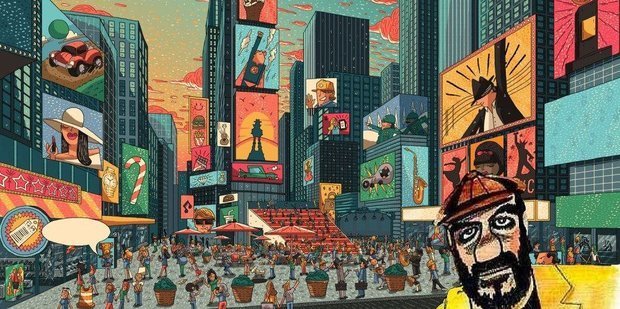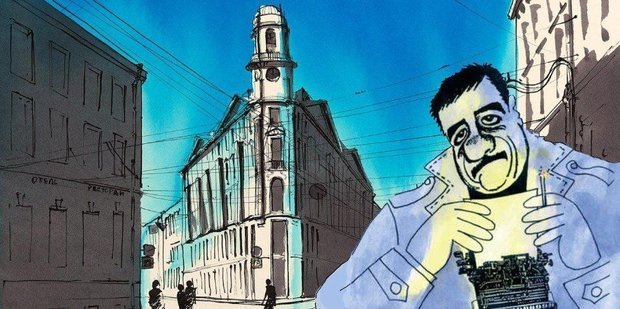Sergey Dovlatov — a bright representative of ‘philosophical nonsense’
This is how the writer described the genre of his stories, in which he described the Soviet reality

Usually Dovlatov is seen as an author who describes everyday life and everyday life cases. But there are many such life writers. The peculiarity of Dovlatov is that he looks at reality as if through a magnifying glass, notices what others do not see.
It is difficult to meet a person who would not like Dovlatov's prose. Perhaps, only those who have not read it can be indifferent to his works. A strong emotional connection with the reader appears thanks to the narrator of Dovlatov's stories. He speaks a simple and accessible language and is often associated with the writer himself.
Literary critic and friend of Dovlatov Andrey Aryev says that “Dovlatov's characters can be bad-looking, they can show the worst character traits. They can be liars, fanfarons, incompetents, tongue-tied preachers... But their mental flaws are always small — compared to the vices of the narrator.”
The main theme of Dovlatov's works is the fate of internally liberated people in an unfree, ugly reality, in which both the writer's characters and the author himself lived. Dovlatov's plots are sad in their essence, but at the same time, as Aryev said, “carry something too human in themselves.” Nevertheless, it is impossible to read his prose without a smile.
Dovlatov said that his task as a writer is to tell about how people live. But in fact, Dovlatov wrote about how they do not know how to live. The thing is that the writer himself was deprived of that skill. In the 1960s and 1970s, he himself did not know how to live “like everyone else”.
Sergey Dovlatov was born on September 3, 1941 in Ufa, where his family was evacuated from Leningrad during the Great Patriotic War. Dovlatov's father was a Jew and a theatre director, his mother was an Armenian and an actress. From the writer's work, one can learn about many stages of his life: about his parents and their work in the theatre, about military service and the protection of the correctional colony in Komi, about life in Tallinn and New York.
During his lifetime, Dovlatov was not published in Russia. In the 1970s, he distributed his works through samizdat and also began publishing them in European magazines, after which he was expelled from the Union of Journalists of the USSR in 1976. As part of the “third wave” of Russian emigration, Dovlatov left the Soviet Union in 1978, and arrived in New York in 1979 to reunite there with his wife and daughter.

Quite quickly, Sergey Dovlatov became one of the most prominent and popular members of the Russian emigrant community. He was co-editor of the emigrant newspaper The New American, he also worked for Radio Liberty. During the twelve years of his life in America, Dovlatov wrote 12 books in Russian. They were published in small editions. But after several Dovlatov stories were published in The New Yorker magazine, he received recognition from a wide audience. English-language publishing houses became interested in the Russian writer, who translated and published the books “The Zone” and “The Suitcase”.
One of the best works of Dovlatov is considered to be the story “The Reserve”, which was completed in 1983. Like all the prose writer's works, it has charm, sharpness and a kind of sweetness. Boris Alikhanov, Dovlatov's alter ego, plays the role of the narrator. He is a young writer who is not published and who has problems with alcohol. In the summer, he works as a guide at the Pushkin Museum-Reserve near Pskov.
“The Reserve” is a microscopic analogue of Soviet reality with its ambitious apparatchiks, ideologues and dissidents. In addition to the image of the narrator, the reader is faced with frightening methodologist Marianna Petrovna, Mitrofanov full of atrophy of will, unusually ignorant Guryanov and village alcoholic Mikhail Ivanovich Sorokin.
Like everything Dovlatov wrote, the pages of “The Reserve” are full of jokes and frivolity. The main character, Boris, tries to combine obligations and difficulties with philosophical questions — how to be a writer in the Soviet Union and how to live in love with his wife and daughter. “Formally, I was a full-fledged creative person. In fact, he was on the verge of mental disorder," Boris says about himself.

These anxious states are intensified when Boris's wife, Tanya, raises the issue of emigration. During an unexpected visit to Pushkin's estate, she says that she is submitting immigration documents next week. But Boris refuses to leave the Soviet Union, he loves his country: “My language, my people, my crazy country… Imagine, I love even policemen.” Emigration seems to be a death to him. He tells Tanya that with a foreign language, “we will lose 80% of our identity”. America seems to him something unreal, fictional. At this moment, Boris echoes another Dovlatov character, prisoner Chichevanov from “The Zone”.
“He had nothing to do outside the prison gates. He was wildly afraid of freedom and suffocated like a fish.”
It's not just that freedom can be unreal and frighteningly new, but that it may not be the freedom that Boris imagines it to be or as promised. One of the options is not to strive for it and refuse to risk a potential “disappointment” in freedom. That's why Boris absurdly defends his non-existent status as a Russian writer. Tanya reminds him that it has never been published in the Soviet Union and, most likely, will never be published. To which Boris retorts that his readers are here: “And there… Who needs my stories in the city of Chicago?" With this, Dovlatov seems to be saying that unrealised potential is probably better than missed reality. Such an ambivalent sense of freedom is characteristic not only of Boris, but also of all the “emigrants” of Dovlatov.
That's why Dovlatov can look at the suitcase, the only thing he brought with him from the Soviet Union, and despise the things inside it. Because things are unimportant. But the stories they keep are important. The stories that fill every page of Dovlatov's books.